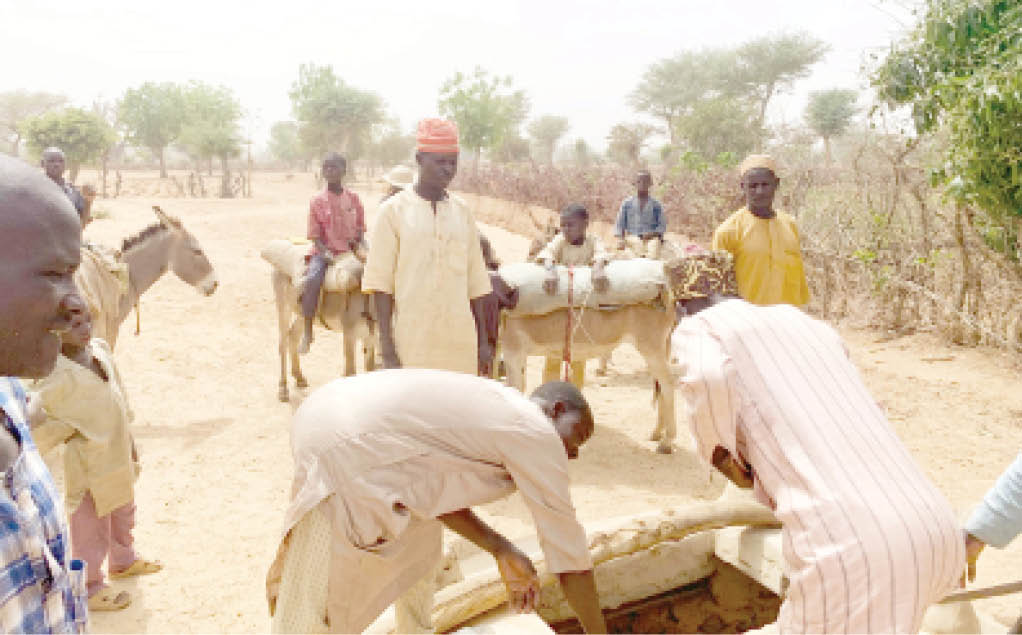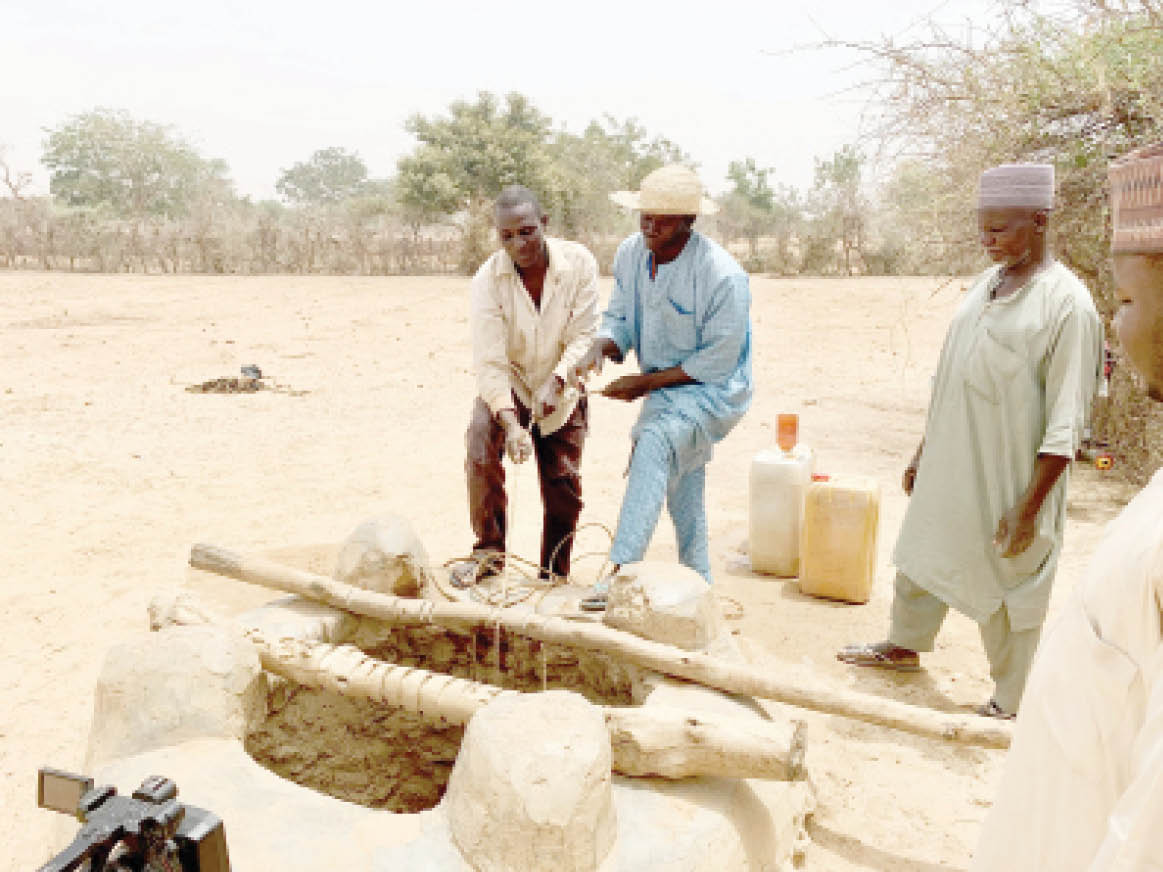For residents of the cluster of villages that make up Kuku, Kunchi Local Government Area of Kano State, daily survival is strictly structured around well-defined choices.
For the children of this settlement, which is just about an hour’s drive from Kano metropolis, the choice is either to go in search of water or starve throughout the day; while for the adult males, the choice is either to go to the farm or assist the children in search of water. For adult females, it is about coming up with formulas on how to share the limited water that the children and/or their fathers are able to bring back home.
“I went out last night by 3am to get water, I did not come back until 5am just when we were about to get late for ‘Suhr’ (start fasting). Now, I am out again with my child who will assist me. Maybe by 5pm, we can get it and come back. I can’t bring it home myself,” Inusa Madugu, one of the residents, told Daily Trust around 12noon on Tuesday.
“Our children have stopped going to school majorly because they have to join us in searching for water. Even our animals like the donkeys we use in fetching the water sometimes show frustration due to insufficient water for them too by either throwing the rider on the floor and biting them or just collapsing on the ground and refusing to move further,” he added.
According to Goal 6 of the United Nation’s sustainable development goals (SDGs) to transform the world, access to safe water, sanitation and hygiene is the most basic human need for health and well-being. But the residents of Kuku villages like Madugu have no access to this basic human need and have to travel at least 10 kilometres from their villages to fetch water from a stream because the only well they hitherto depended on can no longer cater for all of them.
- Bayelsa gov’ship: Petroleum minister, Sylva resigns
- Nigeria records 82,000 maternal deaths annually – UNICEF
The well at Kuku Unguwar Liman was built over 37 years ago by Alaramma Abdu Mai Wake together with another one at Jodade, a village some kilometres away from the cluster of settlements that make up Kuku. It remains the only well that residents of Kuku Dagere, Kuku Gidan Malamai, Kargo, Gwadama, Tofawa and others have to share with residents of Kuku Unguwar Liman.

Alaramma Abdu Mai Wake recalled that before he teamed up with three of his friends to build the well, “We travel at least 10 kilometers five times a day to get enough water for daily use. It takes me one hour of moving fast just to get there. Even my children who were going to school then had to stop so that they can assist me.”
Thirty-seven years later, because of the increase in population and climate change, the well no longer produces enough water to serve the people and their animals.
“I can’t estimate the number of dependents on this well, both humans and animals. All the villages around here; Gwadama, Tofawa, Jodade, Kargo among others all came here to get water,” Alaramma Abdu Mai Wake, who is in his 80s added.
It takes 31 yards of rope to bring out water from the well, Daily Trust observed, even as it was revealed that after fetching five 25-litrres of jerricans, the well has to be left alone for five hours for it to be able to produce more volumes of water.
Daily Trust gathered that because of this, children wake up as early as 4am to go and fetch water and return by 10am, only to return to the stream by 1pm and return by 6pm, spending the entire day in search of water.
This challenge has further complicated the rural-urban migration challenges as residents of the village said there is no household in the villages that has not lost at least one person to migration occasioned by the water scarcity, with many households completely relocating to nearby towns.
“Our biggest nightmare is this lack of water and you have seen it for yourself. This is 12noon; so we will open the well again since the last time we fetched water from it was around 4am,” Haruna Ahmad.
“Most of us here have food to eat, but because there is no water, most of the time one cannot cook, therefore, the family has to wait in hunger because there is no water. We have about 6000 to 7000 people living around this neighbourhood and all of us and our animals either depend on this well or travel a long distance for an alternative,” he added.
For Haruna Magaji, the village head of Kargo, the impact of water scarcity in the area has cost the people more than can be quantified.
“Sometimes we lose our children when they go out to fetch water. In the last four years, at least, eight children have died as a result of falling into the well while trying to fetch water,” he said.
Daily Trust observed that at least two mega solar-powered water projects were situated at different locations in the areas with several overhead tanks, but residents said the projects were nothing but scams which government representatives from the area put on ground.
In one of the projects, residents said since the project was “completed” over four years ago, it has not delivered a gallon of water.
“They (the government) installed solar pumps for us, for years now, but we have not gotten 100 litres from those pumps, which were just built halfway. They are not working, but we learned that the projects are being celebrated as completed projects,” Magaji added.
Haruna Ahmad of Unguwar Liman Kuku said despite having representatives in government and always voting during elections, they have written several appeal letters through their representatives, but no succour has been gotten from the government.
“I have personally written uncountable letters and took them by my hand to our legislator, Garba Yau Gwarmai. He knows about it, and made promises but nothing. We have spent at least eight years appealing. We have 13 polling units here, and we voted this last election, just as we have been doing in the past but there’s nothing for us,” Ahmad said, while appealing to the incoming government and philanthropists to come to their aid.
He acknowledged that after the first save our soul appeal they made, a philanthropist brought in equipment and started constructing two boreholes for them, thereby appealing to other philanthropists and organisations to help augment the efforts already on the ground.

 Join Daily Trust WhatsApp Community For Quick Access To News and Happenings Around You.
Join Daily Trust WhatsApp Community For Quick Access To News and Happenings Around You.


